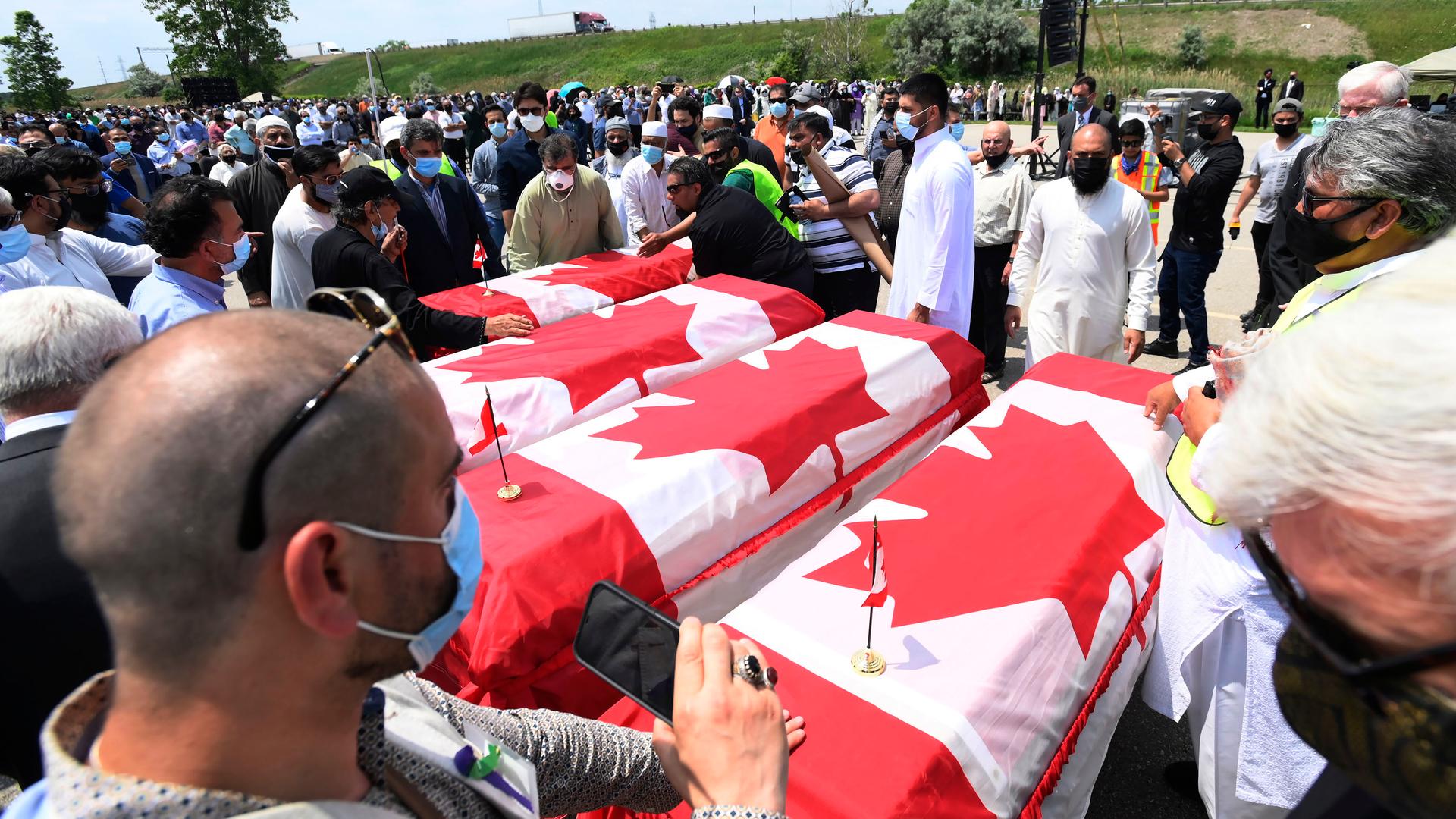Canadian man Nathaniel Veltman has been charged with murder in the case of the Azfaal family in London, Ontario. Veltman deliberately rammed his truck into them when they were out for a stroll in early June in what police called a premeditated attack. Four people were killed and a nine-year-old boy was injured.
Now, for the first time in Canada, prosecutors say they plan to charge a person with terrorism in a case that involves an alleged Islamophobic act. Some legal experts say that adding the terrorism charge signals a shift in how Canada prosecutes those accused of terrorist activity.
Related: Canada grapples with Islamophobia after killing of a Muslim family
Canadian Muslims welcomed the news that Veltman would be charge with terrorism.
“It says to the Muslim community, we value the Muslim community and we will push for accountability.”
“It says to the Muslim community, we value the Muslim community and we will push for accountability,” said Nawaz Tahir, a spokesperson for the London mosque.
Terrorism has been a criminal offense in Canada since the 9/11 attacks on the United States. The law has been used almost exclusively to prosecute people with ties to Islamist groups.
Tahir said that’s left many Muslims feeling frustrated.
“The frustration is, well, when Canadian Muslims are being killed and it appears to be an act of terror, why haven’t terrorism charges been used?” he said.
Tahir points to a shooting rampage at the Quebec City mosque in 2017. Six people died and five were injured. The shooter, Alexandre Bissonnette, was sentenced to 40 years for murder — the longest sentence in Canadian history. But he was never charged with terrorism.
“There was a lot of anger about whether the justice system was serious about protecting Muslims,” Tahir said.
Related: France grieves victims of Nice church knife attack
Like most democracies, Canada defines terrorism as the use of violence that is meant to coerce or scare people. But prosecutors also have to prove that an alleged terrorist act was motivated by religion, politics or ideology.
Wesley Wark, an anti-terrorism expert at the University of Ottawa, said that unless there’s clear evidence, like a confession or a written manifesto, the chances of ideological motivation “may be slim.”
Adding a terrorism charge to an existing murder charge doesn’t increase the sentence. So, Wark said, it’s a safer bet to stick with murder.
“The implications of losing such a case if you lay terrorism charges and other criminal code charges is really devastating.”
“The implications of losing such a case if you lay terrorism charges and other criminal code charges is really devastating,” he said. “It’s devastating to relations of the victims. It’s devastating to the government’s efforts to counter terrorism in all kinds of obvious ways. It’s an embarrassment.”
Related: French teacher’s murder widens France-Turkey rift over secularism
But national security expert Leah West said the balance between getting a guaranteed conviction and sending a message about terrorism has started to shift.
“There is a sense that the public interest does weigh in favor of actually denouncing the act of violence as terrorism — not just to denounce this type of activity for those who might seek to engage or who have similar belief systems — but also to signal to the communities that they have been the targets of terrorism…”
“There is a sense that the public interest does weigh in favor of actually denouncing the act of violence as terrorism — not just to denounce this type of activity for those who might seek to engage or who have similar belief systems — but also to signal to the communities that they have been the targets of terrorism, and what they are suffering from is victimization by a terrorist group or a terrorist,” she said.
West said that it reflects a change in the type of terrorist activity on security officials’ radar, which previously focused on Islamist-inspired extremism.
Related: The Proud Boys disbands in Canada, denies being a terrorist group
“Individuals can be motivated to take terrorist acts by all kinds of ideologies and belief systems, and we’re seeing those increasingly target various communities within Canada,” she said.
Reports from the Canadian Security Intelligence Service say there’s been an increase in ideologically-motivated extremism, and the national Royal Canadian Mounted Police force has flagged concerns about the rapid growth of “hateful” and ideologically-motivated extremism online.
Security officials say the threat posed by xenophobic, mysogynist and anti-government groups and ideologies is greater than ever.
Police in London, Ontario, still haven’t said which evidence they have that shows the attack on the Afzaal family was ideologically motivated.
But Nawaz Tahir said Muslims in the community are shaken to the core. He said many are questioning whether they need to take steps to hide their Muslim faith.
“Some people have asked, you know, should I go for a walk if I’m wearing traditional clothing? Some women have asked, should I now take off my hijab?” he said.
He said a successful prosecution for terrorism, as well as for murder, could be the start of their healing.
